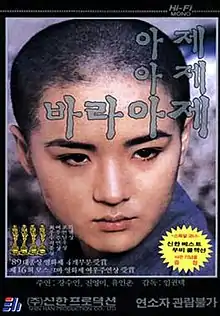Come Come Come Upward
Come Come Come Upward (Korean: 아제 아제 바라 아제; RR: Aje Aje Bara Aje) is a 1989 South Korean film directed by Im Kwon-taek.
| Come Come Come Upward | |
|---|---|
 Poster to Come Come Come Upward (1989) | |
| Korean name | |
| Hangul | 아제 아제 바라 아제 |
| Revised Romanization | Aje aje bara aje |
| McCune–Reischauer | Aje aje para aje |
| Directed by | Im Kwon-taek |
| Written by | Han Sung-won |
| Produced by | Lee Tae-won |
| Starring | Kang Soo-yeon Jin Yeong-mi Yu In-chon Han Ji-il Jeon Moo-song Yoon In-Ja Yoon Yang-ha Kim Se-jun An Byung-kyung Choi Jong-won |
| Cinematography | Ku Jung-mo |
| Edited by | Park Sun-duk |
| Music by | Kim Jeong-kil |
Release date |
|
Running time | 134 minutes |
| Country | South Korea |
| Language | Korean |
Plot
The film examines the lives of two young women linked by their affiliation with a Buddhist temple.
Accolades
- Best Film: Grand Bell Awards[1]
- Best Actress, Bronze St. George (Kang Soo-yeon); 16th Moscow International Film Festival[2]
- Special Prize Im Kwon-taek; Moscow International Film Festival
- Nominated
- Golden St. George (Im Kwon-taek); Moscow International Film Festival
References
- "Grand Bell Awards (Daejong)". korean-drama-guide.com. Retrieved 2021-07-06.
- "16th Moscow International Film Festival (1989)". MIFF. Archived from the original on 2013-03-16. Retrieved 2013-02-24.
Sources
- "Aje Aje Bara Aje (Film review)". Variety. 1989-07-19. p. 21.
- "Im Kwon-taek's Retrospective". 5th Festival of Korean Cinema in Italy. Retrieved 2021-07-06.
- James, David E. (2001). "Im Kwon-Taek – Korean National Cinema and Buddhism". Film Quarterly. Vol. 54, no. 3 (April). pp. 14–31.
This article is issued from Wikipedia. The text is licensed under Creative Commons - Attribution - Sharealike. Additional terms may apply for the media files.